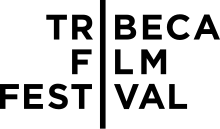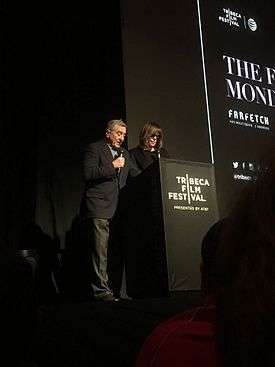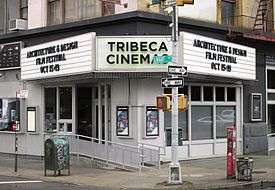Tribeca Film Festival
The Tribeca Film Festival (TFF) is an American film festival held in the Tribeca neighborhood of Manhattan, showcasing a diverse selection of independent films. Since its inaugural year in 2002, it has become an outlet for independent filmmakers in all genres to release their work to a broad audience.
 | |
New York Governor David Paterson opens the 2008 Tribeca Film Festival | |
| Location | New York City, New York, U.S. |
|---|---|
| Founded | 2001 |
| Language | English |
| Website | tribecafilm |
In 2006 and 2007, the festival received over 8,600 film submissions and held 1,500 screenings.[1] The festival's program line-up includes a variety of independent films including documentaries, narrative features and shorts, as well as a program of family-friendly films. The festival also features panel discussions with people in the entertainment world and a music lounge produced with the American Society of Composers, Authors, and Publishers (ASCAP) to showcase artists. One of the more distinctive components of the festival is its artists awards program in which emerging and established artists celebrate filmmakers by providing original works of art that are given to the filmmakers' competition winners. Past artists of the artists award program include Chuck Close, Alex Katz, and Julian Schnabel.
The festival now draws an estimated three million people—including often-elusive celebrities from the worlds of art, film, and music—and generates $600 million annually.
History


The Tribeca Film Festival was founded in 2002 by Jane Rosenthal, Robert De Niro, and Craig Hatkoff, reportedly in response to the September 11 attacks on the World Trade Center and the consequent loss of vitality in the Tribeca neighborhood in Lower Manhattan,[2] although there are reports that its founding was underway prior to the events of 9/11.[3] The inaugural festival launched after 120 days of planning with the help of more than 1,300 volunteers. It was attended by more than 150,000 people[1] and featured several up-and-coming filmmakers. The festival included juried narrative, documentary and short film competitions; a restored classics series; a best of New York series curated by Martin Scorsese; 13 major panel discussions; an all-day family festival; and the premieres of studio films Star Wars: Episode II – Attack of the Clones,[4] About A Boy,[5] the American remake of Insomnia, Divine Secrets of the Ya-Ya Sisterhood, and The League of Extraordinary Gentlemen.
The 2003 festival brought more than 300,000 people.[1] The festival showcased an expanded group of independent features, documentaries and short films from around the world, coupled with studio premieres, panel discussions, music and comedy concerts, a family festival, sports activities, and outdoor movie screenings along the Hudson River. The family festival featured children's movie screenings, storytelling, family panels, workshops, and interactive games culminating in a daylong street fair that drew a crowd estimated at 250,000 people.[6]
At the end of 2003, De Niro purchased the theater at 54 Varick Street which had housed the recently closed Screening Room, an art house that had shown independent films nightly,[7] renaming it the Tribeca Cinema. It became one of the venues of the festival.
In an effort to serve its mission of bringing independent film to the widest possible audience, in 2006, the festival expanded its reach in New York City and internationally. In New York City, Tribeca hosted screenings throughout Manhattan as the festival's 1,000-plus screening schedule outgrew the capacity downtown. Internationally, the Festival brought films to the Rome Film Festival. As part of the celebrations in Rome, Tribeca was awarded the first-ever "Steps and Stars" award, presented on the Spanish Steps. A total of 169 feature films and 99 shorts were selected from 4,100 film submissions, including 1,950 feature submissions—three times the total submissions from the first festival in 2002. The festival featured 90 world premieres, nine international premieres, 31 North American premieres, 6 U.S. premieres, and 28 New York City premieres.
In 2009, Rosenthal, Hatkoff and De Niro were named number 14 on Barron's list of the world's top 25 philanthropists for their role in regenerating TriBeCa's economy after September 11.[8]
As of 2010, the festival is run as a business by Tribeca Enterprises.[9] Andrew Essex has been the CEO of Tribeca Enterprises since January, 2016.
In 2011, L.A. Noire became the first video game to be recognized by the Tribeca Film Festival. In 2013, Beyond: Two Souls, featuring Ellen Page and Willem Dafoe, became only the second game to be premiered at the festival.
The 19th Tribeca Film Festival, originally scheduled for April 15–26 2020, was cancelled due to the COVID-19 pandemic. Organizers told ticket holders to monitor its website for ticket refund information, implying the event will not be rescheduled. Organizers also asked people to monitor its website for more on how they are “moving forward”, without making any statements or commitments on holding future editions of the film festival.[10]
Awards
U.S. Narrative Competition
Best U.S. Narrative Feature
- 2020 – The Half of It, directed by Alice Wu[11]
- 2019 – Burning Cane, written and directed by Phillip Youmans[12]
- 2018 – Diane, written and directed by Kent Jones[13]
- 2017 – Keep the Change written and directed by Rachel Israel[14]
- 2016 – Dean, directed by Demetri Martin
Best Actor in a U.S. Narrative Feature Film
- 2020 – Steve Zahn in Cowboys.[11]
- 2018 – Jeffrey Wright in O.G[13]
- 2017 – Alessandro Nivola in One Percent More Humid[14]
- 2016 – Dominic Rains for Burn Country
Best Actress in a U.S. Narrative Feature Film
- 2020 – Assol Abdulina in Materna[11]
- 2019 – Haley Bennett in Swallow
- 2018 – Alia Shawkat in Duck Butter[13]
- 2017 – Nadia Alexander in Blame[14]
- 2016 – Mackenzie Davis for Always Shine
Best Cinematography in a U.S. Narrative Feature Film
- 2020 – Greta Zozula, Chananun Chotrungroj and Kelly Jeffrey for Materna.[11]
- 2019 – Phillip Youmans for Burning Cane[12]
- 2018 – Wyatt Garfield for Diane[13]
- 2017 – Chris Teague for Love After Love[14]
- 2016 – Michael Ragen for Kicks
Best Screenplay in a U.S. Narrative Feature Film
- 2020 – Cowboys, written by Anna Kerrigan[11]
- 2018 – Diane, written by Kent Jones[13]
- 2017 – Abundant Acreage Available, written by Angus MacLachlan[14]
World Narrative Competition
Best Narrative Feature
- 2020 – The Hater, directed by Jan Komasa[11]
- 2019 – Scheme Birds, directed by Ellen Fiske and Ellinor Hallin[15]
- 2017 – Son of Sofia (O Gios tis Sofias) written and directed by Elina Psykou[14]
- 2016 – Junction 48, directed by Udi Aloni
- 2015 – Virgin Mountain, directed by Dagur Kári
- 2014 – Zero Motivation, directed by Talya Lavie[16]
- 2013 – The Rocket,[17] directed by Kim Mordaunt
- 2012 – War Witch, directed by Kim Nguyen
- 2011 – She Monkeys, directed by Lisa Aschan
- 2010 – When We Leave, directed by Feo Aladag
- 2009 – About Elly, directed by Asghar Farhadi
- 2008 – Let the Right One In, directed by Tomas Alfredson
- 2007 – My Father My Lord, directed by David Volach
- 2006 – Iluminados por el fuego, directed by Tristán Bauer
- 2005 – Stolen Life, directed by Li Shaohong
- 2004 – Green Hat, directed by Liu Fendou
- 2003 – Blind Shaft, directed by Li Yang
- 2002 – Roger Dodger, directed by Dylan Kidd
Best New Narrative Filmmaker
- 2020 – Gaspar Antillo for Nobody Knows I'm Here[11]
- 2019 – Ellen Fiske and Ellinor Hallin for Scheme Birds[15]
- 2017 – Rachel Israel, director of Keep the Change[14]
- 2015 – Zachary Treitz for Men Go to Battle
- 2014 – Josef Wladyka for Manos Sucias[16]
- 2013 – Emanuel Hoss-Desmarais for Whitewash
- 2012 – Lucy Mulloy, Una Noche
- 2011 – Park Jung-bum for The Journals of Musan
- 2010 – Kim Chapiron for Dog Pound
- 2009 – Rune Denstad Langlo for North
- 2008 – Huseyin Karabey for My Marlon and Brando
- 2007 – Enrique Begne for Two Embraces
- 2006 – Marwan Hamed for The Yacoubian Building
- 2005 – Alicia Scherson for Play
- 2004 – Liu Fendou for Green Hat
- 2003 – Valeria Bruni Tedeschi for It's Easier for a Camel...
- 2002 – Eric Eason for Manito
Best Actor in a Narrative Feature Film
- 2020 – Noé Hernández in Kokoloko[11]
- 2017 – Guillermo Pfening in Nobody's Watching (Nadie Nos Mira)[14]
- 2015 – Gunnar Jónsson for Virgin Mountain
- 2014 – Paul Schneider for Goodbye to All That[16]
- 2013 – Sitthiphon Disamoe, The Rocket
- 2012 – Dariel Arrechada and Javier Nuñez Florian, Una Noche
- 2011 – Ramadhan "Shami" Bizimana in Grey Matter
- 2010 – Eric Elmosnino in Gainsbourg (Vie héroïque)
- 2009 – Ciarán Hinds in The Eclipse
- 2008 – Thomas Turgoose and Piotr Jagiello for their roles in Somers Town
- 2007 – Lofti Ebdelli in Making Of. (Akher film)
- 2006 – Jürgen Vogel in Der Freie Wille
- 2005 – Cees Geel in Simon
- 2004 – Ian Hart in Blind Flight
- 2003 – Igor Bareš in Výlet and Ohad Knoller in Yossi & Jagger
Best Actress in a Narrative Feature Film
- 2020 – Shira Haas in Asia[11]
- 2017 – Marie Leuenberger in The Divine Order (Die göttliche Ordnung)[14]
- 2016 – Radhika Apte in Madly (Section : Clean Shaven)
- 2015 – Hannah Murray in Bridgend
- 2014 – Valeria Bruni Tedeschi in Human Capital[16]
- 2013 – Veerle Baetens in The Broken Circle Breakdown
- 2012 – Rachel Mwanza in War Witch
- 2011 – Carice van Houten in Black Butterflies
- 2010 – Sibel Kekilli in When We Leave
- 2009 – Zoe Kazan in The Exploding Girl
- 2008 – Eileen Walsh in Eden
- 2007 – Marina Hands in Lady Chatterley
- 2006 – Eva Holubová in Holiday Makers
- 2005 – Felicity Huffman in Transamerica
- 2004 – Fernanda Montenegro in O Outro Lado da Rua
- 2003 – Valeria Bruni Tedeschi in It's Easier for a Camel...
Best Documentary Feature
- 2020 – Socks on Fire, directed by Bo McGuire[11]
- 2017 – Bobbi Jene, directed by Elvira Lind[14]
- 2015 – Democrats, directed by Camilla Nielsson
- 2014 – Point and Shoot, directed by Marshall Curry[16]
- 2013 – The Kill Team, directed by Dan Krauss
- 2012 – The World Before Her, directed by Nisha Pahuja
- 2011 – Bombay Beach, directed by Alma Har'el
- 2010 – Monica & David, directed by Alexandra Codina
- 2009 – Racing Dreams, directed by Marshall Curry
- 2008 – Pray the Devil Back to Hell, directed by Gini Reticker
- 2007 – Taxi to the Dark Side, directed by Alex Gibney
- 2006 – The War Tapes, directed by Deborah Scranton
- 2005 – El Perro Negro: Stories from the Spanish Civil War, directed by Péter Forgács
- 2004 – Kill Your Idols, directed by Scott Crary
- 2003 – A Normal Life, directed by Elizabeth Chai Vasarhelyi and Hugo Berkeley
- 2002 – Chiefs, directed by Daniel Junge
Best New Documentary Filmmaker
- 2020 – Jessica Earnshaw for Jacinta[11]
- 2017 – Sarita Khurana and Smriti Mundhra for A Suitable Girl[14]
- 2016 – David Feige for Untouchable
- 2015 – Ewan McNicol and Anna Sandilands for Uncertain
- 2014 – Alan Hicks for Keep On Keepin' On[16]
- 2013 – Sean Dunne for Oxyana
- 2011 – Pablo Croce for Like Water
- 2010 – Clio Barnard for The Arbor
- 2009 – Ian Olds for Fixer: The Taking of Ajmal Naqshbandi
- 2008 – Carlos Carcass for Old Man Bebo
- 2007 – Vardan Hovhannisyan for A Story of People in War and Peace
- 2006 – Pelin Esmer for The Play
- 2005 – Jeff Zimbalist and Matt Mochary for Favela Rising
- 2004 – Paulo Sacramento for The Prisoner of the Iron Bars: Self-Portraits
Best Documentary Editing
- 2020 – Amy Foete for Father, Soldier, Son
- 2017 – Adam Nielson for Bobbi Jene
Best Cinematography
Best Screenplay
- 2020 – Tryst with Destiny, written by Prashant Nair[11]
- 2017 – Ice Mother (Bába z ledu) written by Bohdan Sláma[14]
- 2015 – Dagur Kári for Virgin Mountain
- 2014 – Guillaume Nicloux for The Kidnapping of Michel Houellebecq
- 2013 – Carl Joos and Felix Van Groeningen for The Broken Circle Breakdown
- 2012 – Daniel Burman and Sergio Dubcovsky for La suerte en tus manos
- 2011 – Jannicke Systad Jacobsen for Turn Me On, Dammit!
Best Narrative Editing
- 2015 – Oliver Bugge Coutté for Bridgend
- 2014 – Keith Miller for Five Star
Best Narrative Short
- 2020 – No More Wings, directed by Abraham Adeyemi[11]
- 2017 – Retouch, directed by Kaveh Mazaheri[14]
- 2015 – Listen, directed by Hamy Ramezan and Rungano Nyoni
- 2014 – The Phone Call, directed by Mat Kirkby[16]
- 2013 – The Nightshift Belongs to the Stars, directed by Edoardo Ponti
- 2010 – Father Christmas Doesn't Come Here, written by Bongi Ndaba, Sibongile Nkosana directed by Bekhi Sibiya
- 2009 – The North Road, directed by Carlos Chahine
- 2008 – New Boy, directed by Steph Green
- 2007 – The Last Dog in Rwanda, directed by Jens Assur
- 2006 – The Shovel, directed by Nick Childs
- 2005 – Cashback, directed by Sean Ellis
- 2004 – Shock Act, directed by Seth Grossman
- 2002 – Bamboleho, directed by Luis Prieto
Best Documentary Short
- 2020 – My Father The Mover, directed by Julia Jansch[11]
- 2017 – The Good Fight, directed by Ben Holman[14]
- 2015 – Body Team 12, directed by David Darg
- 2014 – One Year Lease, directed by Brian Bolster[16]
- 2013 - Coach, directed by Bess Kargman
- 2010 – White Lines and the Fever: The Death of DJ Junebug, directed by Travis Senger
- 2009 – Home, directed by Mathew Faust
- 2008 – Mandatory Service, directed by Jessica Habie
- 2007 – A Son's Sacrifice, directed by Yoni Brook
- 2006 – Native New Yorker, directed by Steve Bilich
- 2005 – The Life of Kevin Carter, directed by Dan Krauss
- 2004 – Sister Rose's Passion, directed by Oren Jacoby
- 2003 – Milton Rogovin: The Forgotten Ones, directed by Harvey Wang
- 2002 – All Water Has a Perfect Memory, directed by Natalia Almada
Student Visionary Award
- 2020 – Cru-Raw, directed by David Oesch[11]
- 2017 – Fry Day, directed by Laura Moss[14]
- 2015 – Catwalk, directed by Ninja Thyberg
- 2014 – Nesma's Bird, directed by Najwan Ali and Medoo Ali[16]
- 2013 – Life Doesn't Frighten Me, directed by Stephen Dunn
- 2010 – some boys don't leave, directed by Maggie Kiley
- 2009 – Small Change, directed by Anna McGrath
- 2008 – Elephant Garden, directed by Sasie Sealy
- 2007 – Good Luck Nedim, directed by Marko Santic and Someone Else's War, directed by Lee Wang
- 2006 – Dead End Job, directed by Samantha Davidson Green
- 2005 – Dance Mania Fantastic, directed by Sasie Sealy
- 2004 – 'Independent Lens' (American Made), directed by Sharat Raju
Nora Ephron Prize
- 2020 – Ruthy Pribar for Asia[11]
- 2019 – Rania Attieh for Initials S.G.
- 2018 – Nia DaCosta, for Little Woods
- 2017 – Petra Volpe, writer/director of The Divine Order[14]
- 2016 – Rachel Tunnard for Adult Life Skills
- 2015 – Laura Bispuri for Sworn Virgin
- 2014 – Talya Lavie for Zero Motivation
- 2013 – Meera Menon for Farah Goes Bang
Best Animated Short
- 2017 – Odd is an Egg (Odd er et egg) directed by Kristin Ulseth[14]
Storyscapes Award
- 2017 — TREEHUGGER : WAWONA created by Barnaby Steel, Ersin Han Ersin and Robin McNicholas[18]
See also
References
- "2011 Tribeca Film Festival Fact Sheet" (PDF). Media.tribecafilm.com. Retrieved January 5, 2012.
- "Cuban 'defector film' takes Tribeca prizes". BBC News. April 27, 2012. Retrieved April 27, 2012.
- "Documents reveal pre-9/11 plans for Tribeca Film Festival". Archive.org. 2007. Retrieved October 12, 2012.
- "The Children's Aid Society and The Tribeca Film Festival to Co-Host The New York City Premiere of 'Star Wars: Episode II Attack of The Clones' on May 12th". Prnewswire.com. Retrieved May 12, 2014.
- Lemire, Christy (April 25, 2006). "Tribeca Film Festival returns to its inspiration". Pittsburgh Post-Gazette. Associated Press.
- "Businesses say business was up for film festival". Downtown Express. Retrieved November 21, 2018.
- Rogers, Josh (December 17, 2003). "De Niro and partners buy Tribeca's Screening Room". The Villager. 73 (33). Retrieved January 5, 2012.
- Suzanne McGee (November 30, 2009). "The 25 Best Givers". Barron's. Retrieved March 31, 2010.
- Creepy, Uncle (March 3, 2010). "Tribeca Film Festival Expands to Include Tribeca Film and Tribeca Film Festival Virtual". Dreadcentral.com . Retrieved January 5, 2012.
- "A Statement from Tribeca". tribecafilm.com. March 12, 2020. Retrieved March 12, 2020.
- Moreau, Jordan (April 29, 2020). "'The Half of It,' Steve Zahn, Assol Abdullina Win Awards at 2020 Tribeca Film Festival". Variety. Retrieved May 2, 2020.
- McDonald, Soraya Nadia. "Phillip Youmans becomes first black director to win at Tribeca with his feature debut, 'Burning Cane'". The Undefeated. Retrieved May 8, 2019.
- "Here are the Winners of the 2018 Tribeca Film Festival Juried Awards | Tribeca". Tribeca Film Festival. Retrieved July 4, 2018.
- "Here are the Winners of the 2017 Tribeca Film Festival Juried Awards". Tribeca Film Festival.
- "Tribeca: 'Burning Cane,' 'Scheme Birds' Among Awards Winners". The Hollywood Reporter. Retrieved June 18, 2020.
- "2014 Tribeca Film Festival Announces Award Winners". Tribeca Film Festival. April 24, 2014. Archived from the original on October 28, 2014. Retrieved October 27, 2014.
- "Tribeca honours Australian film The Rocket with top prize". BBC News. Retrieved April 26, 2013.
- "Here are the 2017 Tribeca Film Festival Juried Award Winners | Tribeca". Tribeca. Retrieved March 25, 2018.